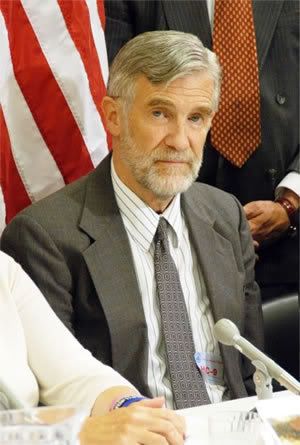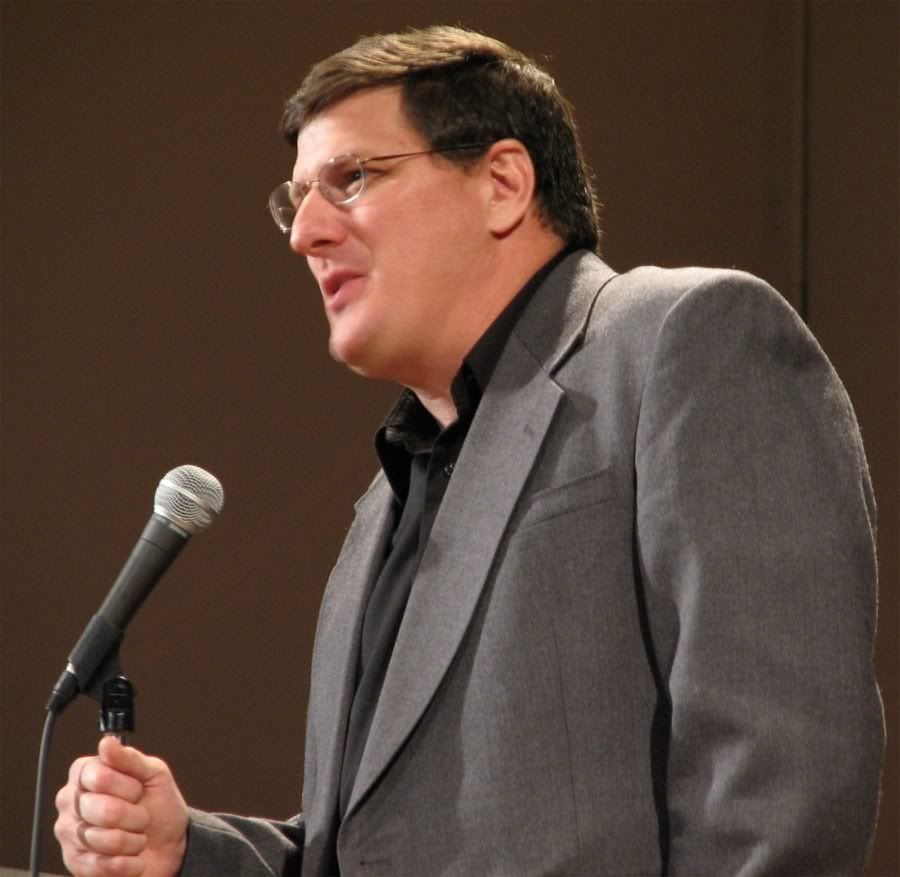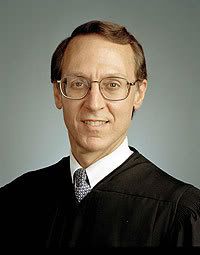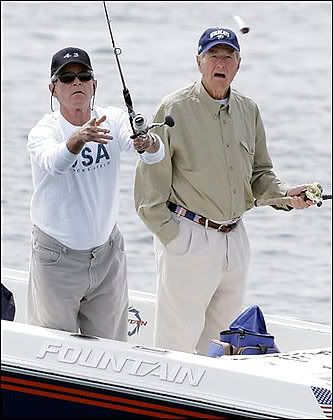Ever since Bush and Cheney took over government, they've taken the chains off of the nuclear industry, and put plans for building and certifying new nuclear power plants on fast track. If we ever were to get our hands on the notes from Dick Cheney's energy task force meetings, I'm sure that they would include a cunning public relations strategy just like the one Bush and Cheney created in the days leading up to the vote in Congress to go to war in Iraq. Only instead of the
White
House
Iraq
Group, this one is called WHEG (the "
White
House
Energy
Group") and is for conning Americans into believing that nuclear is the answer to all of our energy problems. "We'll be able to
grow and develop (overpopulate, deforest, asphalt over) every square inch of the planet."
Nuclear energy is not the solution, and every few months I post articles from regional news organizations, about accidents and foul-ups within the industry, that don't get picked up by the national media.
Lately, as the pressure mounts to end Bush's fiasco in Iraq, the PR campaign for nuclear has picked up. 'Big Oil' has been hedging their bets and diversifying for a while now, evolving into 'Big Energy' with a big stake in 'going nuclear.' Like me and others, anti-nuclear activist and write Rebecca Solnit has been preparing for the day when the debate comes out from behind closed doors and onto the public stage in full daylight.
From
Orion magazine, Rebecca Solnit writes, "Reasons not to glow . . . On Not Jumping Out of The Frying Pan Into The Eternal Fires":
Chances are good, gentle reader, that you are going to have to sit next to someone in the coming year who will assert that nuclear power is the solution to climate change. What will you tell them? There’s so much to say. You could be sitting next to someone who hasn’t really considered the evidence yet. Or you could be sitting next to scientist and Gaia theorist James Lovelock, a supporter of Environmentalists for Nuclear EnergyTM, which quotes him saying, “We have no time to experiment with visionary energy sources; civilisation is in imminent danger and has to use nuclear-the one safe, available, energy source-now or suffer the pain soon to be inflicted by our outraged planet.
“If you sit next to Lovelock, you might start by mentioning that half the farms in this country had windmills before Marie Curie figured out anything about radiation or Lise Meitner surmised that atoms could be split. Wind power is not visionary in the sense of experimental. Neither is solar, which is already widely used. Nor are nukes safe, and they take far too long to build to be considered readily available. Yet Stewart Brand, of Whole Earth Catalog fame, has jumped on the nuclear bandwagon, and so has Greenpeace founding member turned PR flack Patrick Moore. So you must be prepared.
Of course the first problem is that nuclear power is often nothing more than a way to avoid changing anything. A bicycle is a better answer to a Chevrolet Suburban than a Prius is, and so is a train, or your feet, or staying home, or a mix of all those things. Nuclear power plants, like coal-burning power plants, are about retaining the big infrastructure of centralized power production and, often, the habits of obscene consumption that rely on big power. But this may be too complicated to get into while your proradiation interlocutor suggests that letting a thousand nuclear power plants bloom would solve everything.
Instead, you may be able to derail the conversation by asking whether they’d like to have a nuclear power plant or waste repository in their backyard, which mostly they would rather not, though they’d happily have it in your backyard. This is why the populous regions of the eastern U.S. keep trying to dump their nuclear garbage in the less-populous regions of the West. My friend Chip Ward (from nuclear-waste-threatened Utah) reports, “To make a difference in global climate change, we would have to immediately build as many nuclear power plants as we already have in the U.S. (about 100) and at least as many as 2,000 worldwide.” Chip goes on to say that “Wall Street won’t invest in nuclear power because it is too risky. . . . The partial meltdown at Three Mile Island taught investment bankers how a two-billion-dollar investment can turn into a billion-dollar clean-up in under two hours.” So we, the people, would have to foot the bill.
Nuclear power proponents like to picture a bunch of clean plants humming away like beehives across the landscape. Yet when it comes to the mining of uranium, which mostly takes place on indigenous lands from northern Canada to central Australia, you need to picture fossil-fuel-intensive carbon-emitting vehicles, and lots of them-big disgusting diesel-belching ones. But that’s the least of it. The Navajo are fighting right now to prevent uranium mining from resuming on their land, which was severely contaminated by the postwar uranium boom of the 1940s and 1950s. The miners got lung cancer. The children in the area got birth defects and a 1,500 percent increase in ovarian and testicular cancer. And the slag heaps and contaminated pools that were left behind will be radioactive for millennia.
If these facts haven’t dissuaded this person sitting next to you, try telling him or her that most mined uranium-about 99.28 percent-is fairly low-radiation uranium-238, which is still a highly toxic heavy metal. To make nuclear fuel, the ore must be “enriched,” an energy-intensive process that increases the .72 percent of highly fissionable, highly radioactive U-235 up to 3 to 5 percent. As Chip points out, four dirty-coal-fired plants were operated in Kentucky just to operate two uranium enrichment plants. What’s left over is a huge quantity of U-238, known as depleted uranium, which the U.S. government classifies as low-level nuclear waste, except when it uses the stuff to make armoring and projectiles that are the source of so much contamination in Iraq from our first war there, and our second.
Reprocessing spent nuclear fuel was supposed to be one alternative to lots and lots of mining forever and forever. The biggest experiment in reprocessing was at Sellafield in Britain. In 2005, after decades of contamination and leaks and general spewing of horrible matter into the ocean, air, and land around the reprocessing plant, Sellafield was shut down because a bigger-than-usual leak of fuel dissolved in nitric acid-some tens of thousands of gallons-was discovered. It contained enough plutonium to make about twenty nuclear bombs. Gentle reader, this has always been one of the prime problems of nuclear energy: the same general processes that produce fuel for power can produce it for bombs. In India. Or Pakistan. Or Iran. The waste from nuclear plants is now the subject of much fretting about terrorists obtaining it for dirty bombs-and with a few hundred thousand tons of high-level waste in the form of spent fuel and a whole lot more low-level waste in the U.S. alone, there’s plenty to go around.
By now the facts should be on your side, but do ask how your neighbor feels about nuclear bombs, just to keep things lively.
The truth is, there may not be enough uranium out there to fuel two thousand more nuclear power plants worldwide. Besides, before a nuke plant goes online, a huge amount of fossil fuel must be expended just to build the thing. Still, the biggest stumbling block, where climate change is concerned, is that it takes a decade or more to construct a nuclear plant, even if the permitting process goes smoothly, which it often does not. So a bunch of nuclear power plants that go online in 2017 at the earliest are not even terribly relevant to turning around our carbon emissions in the next decade-which is the time frame we have before it’s too late.
If you’re not, at this point, chasing your poor formerly pronuclear companion down the hallway, mention that every stage of the nuclear fuel cycle is murderously filthy, imparting long-lasting contamination on an epic scale; that a certain degree of radioactive pollution is standard at each of these stages, but the accidents are now so many in number that they have to be factored in as part of the environmental cost; that the plants themselves generate lots of radioactive waste, which we still don’t know what to do with-because the stuff is deadly . . . anywhere . . . and almost forever. And no, tell them, this nuclear colonialism is not an acceptable sacrifice, since it is not one the power consumers themselves are making. It’s a sacrifice they’re imposing on people far away and others not yet born, a debt they’re racking up at the expense of people they will never meet.
Sure, you can say nuclear power is somewhat less carbon-intensive than burning fossil fuels for energy; beating your children to death with a club will prevent them from getting hit by a car. Ravaging the Earth by one irreparable means is not a sensible way to prevent it from being destroyed by another. There are alternatives. We should choose them and use them.
An antinuclear activist in Nevada from 1988 to 2002, Rebecca Solnit just put up a clothesline in the backyard and will get around to installing the solar panels any day now. National Book Critics Circle award-winner Solnit’s most recent book is Storming the Gates of Paradise.
Lately I've been thinking that those of us who see the inevitable danger to life on the planet from nuclear power might want to revolutionize our position by agreeing to the building of new plants on one condition: They must be built inside of the most valuable, desireable, prestigious gated communities in the nation (including St. Michaels, Maryland; Walker's Point in Kennebunkport; Teton Pines, Wyoming; Wall St., N.Y.C.; Crawford, Texas; Bel-Air, California).
No longer should the Cheneys and the Bushes be able to foist the polluting, life and health destroying machinery that is the source of their wealth and power on the rest of us. Let Barbara and Jenna Bush, and Elizabeth and Mary Cheney's children grow up next to the chemical and coal-fired plants that America's poor and middle class children have been living with. If they are so certain about the safety of this technology, they should be the canaries in their own mines.







